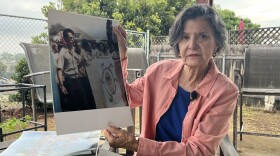In the coastal Mexican city of Acapulco, teachers are out on strike — not over wages, working conditions or pensions, but because of crime.
Teachers say they're being extorted, kidnapped and intimidated by local gangs and they're refusing to return to their classrooms until the government does something to protect them. Over the last two years, drug cartels fighting for control of Acapulco have terrorized the once-popular tourist resort.
I believe that this fight that the teachers are making is a defining moment, because having been a teacher for 32 years, I'm convinced that teachers have their finger on the pulse of what's happening in every house, every neighborhood, every street, every family.
Public schools across most of Mexico resumed in late August. But in Acapulco, more than a hundred schools have been shut for more than a month. Last week about 7,000 teachers marched up the city's main tourist strip, past the stores selling Senor Frog T-shirts and quart-sized margaritas. Their banners demanded security and peace.
As Mexico's drug war drags on, and the government cracks down on narcotics trafficking, there's been a spike across the country in kidnapping, car theft and extortion. Teachers refused to reopen schools in Acapulco after there were several anonymous demands for educators to hand over half their salaries to criminal gangs by Oct. 1 — or be killed.
In the middle of what should be a school day, hundreds of teachers have gathered at a school near the center of Acapulco, awaiting instructions from their union leaders.
A primary school teacher — who for security reasons only wants to give her first name, Bety — says the teachers are being attacked, extorted and kidnapped with impunity.
Teaching Confronting A Widespread Problem
Manuel Lozano Hernandez, a veteran educator in the Acapulco public schools, says the teachers are publicly fighting a problem that's plaguing taxi drivers, shopkeepers, restaurant owners and even street vendors in Acapulco.
"I believe that this fight that the teachers are making is a defining moment, because having been a teacher for 32 years, I'm convinced that teachers have their finger on the pulse of what's happening in every house, every neighborhood, every street, every family. Thus, this issue is very important," he says.
Longtime residents of Acapulco say crime in what used to be one of Mexico's leading tourist resorts is out of control. There have been shootouts by heavily armed gunmen in front of beach hotels. Several women were decapitated this year at the start of the Semana Santa holiday, Mexico's big spring break.
As in many other drug-plagued Mexican cities, federal police and soldiers in ski masks patrol the streets in armored convoys.
One local college student says the recent crime wave is like a psychosis that's gripped Acapulco. A waiter says violent crime is crushing the economy. And now it's delayed the start of classes at many schools across the city by more than a month.
Mercedes Martinez Calvo, the city's director of education, says the teacher walkout clearly has had a huge negative effect on students.
She says schools — and particularly teachers — are going to have to come up with a plan of how to make up all of the instruction time that's been lost.
Martinez says this might mean longer school days or classes on weekends.
Parents recognize the severity of the current crime problem and sympathize with the teachers, Martinez says. But she adds that there's growing public frustration with the strike. She says each day more and more schools are opening across Acapulco.
Copyright 2022 NPR. To see more, visit https://www.npr.org. 9(MDAzMjM2NDYzMDEyMzc1Njk5NjAxNzY3OQ001))







